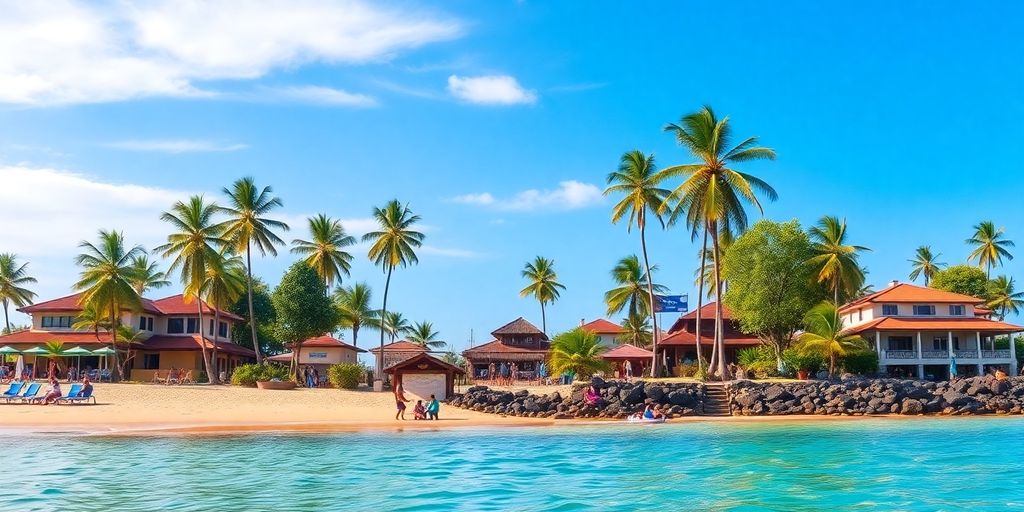Understanding the Cost of Living in Bali: A Comprehensive Guide for 2025

Thinking about moving to Bali in 2025? You’re probably wondering about the cost of living there. Bali is a dream spot for many because of its beautiful landscapes and unique culture. Plus, it’s generally more affordable than many Western countries. However, costs can vary based on your lifestyle and where you choose to live on the island. From accommodation and food to transportation and entertainment, this guide will help you understand what to expect and how to plan your budget effectively.
Key Takeaways
- Bali offers a range of accommodation options, from budget homestays to luxury villas, with prices varying by location.
- Dining can be cheap if you stick to local warungs, but Western dining options will cost more.
- Renting a scooter is a popular and affordable way to get around, but public transport is limited.
- Healthcare is accessible, but consider insurance for comprehensive coverage.
- Utilities like electricity can add up, especially with air conditioning, so budget accordingly.
Accommodation Options in Bali
Choosing Between Villas and Homestays
When you’re in Bali, deciding where to stay can be a real adventure. You’ve got choices, from cozy homestays to swanky villas. Homestays are great if you’re looking for something budget-friendly. They typically cost around $300 a month and often include essentials like air-conditioning and Wi-Fi. On the other hand, villas offer more privacy and luxury, starting at about $8000 per year for a 2-3 bedroom villa with a pool. The fancy ones can go up to $25,000 annually. It’s all about what you’re looking for.
Cost Variations by Location
Where you decide to stay in Bali will seriously impact your wallet. In tourist-heavy areas, expect to pay more. But if you’re okay with being a bit off the beaten path, you can find cheaper options. For instance, a simple room in a popular area might set you back $300 a month, while the same room in a quieter area could be significantly less. It’s all about balancing location with your budget.
Long-term vs Short-term Rentals
If you’re planning to stick around Bali for a while, long-term rentals are the way to go. They’re usually more cost-effective than short-term stays. Long-term rentals can range from $300 a month for a homestay to $1000 for a villa, depending on what you’re after. Short-term rentals, while flexible, tend to be pricier. So, if you’re in for the long haul, consider settling into a place that offers a better deal over time.
Bali offers a wide range of living options, so take your time to explore and find what suits you best. Whether it’s a quaint homestay or a luxurious villa, there’s something for everyone on this beautiful island.
For those seeking luxury, Mulia Villas, Padma Resort Ubud, and Pramana Watu Kurung are popular choices, offering a range of experiences that can make your stay unforgettable.
Dining and Food Expenses
Local Cuisine and Warungs
When it comes to dining in Bali, local cuisine is a must-try. Warungs, small family-owned eateries, are scattered all over the island. Here, you can savor authentic Indonesian dishes like Nasi Goreng and Mie Goreng for as little as $1 to $2 per meal. These places not only offer a taste of traditional flavors but also a glimpse into local life. Eating at warungs is one of the most affordable ways to enjoy Bali’s culinary scene.
If you’re looking to explore further, ask locals about their favorite spots or check out night markets for a wider variety of dishes. This way, you can truly immerse yourself in the local food culture while keeping your budget in check.
Western Dining Options
For those craving a taste of home or wanting to try something different, Bali has plenty of Western-style restaurants and cafes. Meals here range from $5 to $15, depending on the location and type of cuisine. Whether you’re in the mood for Italian pasta or Japanese sushi, there’s something for everyone. These places often provide a more upscale dining experience, with a cozy ambiance and international menus.
Bali is renowned for its vibrant dining scene, which includes everything from beachfront cafes to high-end restaurants. Expats and tourists alike enjoy the diverse culinary offerings available throughout the island.
Grocery Shopping Tips
Cooking at home is another great way to manage your food expenses. Local markets are brimming with fresh produce, meats, and seafood at reasonable prices. A monthly grocery budget can range from $100 to $300, depending on your preferences and dietary needs.
Here are some tips for grocery shopping in Bali:
- Visit local markets early in the morning for the freshest produce.
- Compare prices between local markets and supermarkets to find the best deals.
- Buy in bulk when possible, especially for staples like rice and noodles.
By shopping smart, you can enjoy a healthy and varied diet without breaking the bank. Plus, cooking at home allows you to experiment with local ingredients and flavors, adding a personal touch to your meals.
Bali’s food scene is diverse and exciting, offering something for every palate and budget. Whether you’re dining out at a local warung or preparing a meal at home, you’ll find plenty of options to satisfy your culinary cravings.
Transportation and Mobility

Renting Scooters and Cars
Scooters are the go-to for many in Bali. They’re affordable, nimble, and great for weaving through traffic. Renting a basic scooter can set you back about $45 to $70 a month. Fuel is cheap too—around $3 for a full tank. If you’re more comfortable with four wheels, renting a car is an option, though pricier, at roughly $450 a month. Remember, driving in Bali can be chaotic, so it’s important to be cautious.
Public Transportation Options
Public transport in Bali isn’t as developed as in some other places. Buses are available but not always reliable. However, ride-sharing apps like Gojek and Grab have become super popular. They’re convenient and you can see the cost upfront, which is usually between $1 to $10 depending on the distance.
Cost of Fuel and Maintenance
Fuel costs in Bali are quite low compared to Western countries, making driving a more viable option for many. Maintenance costs for scooters are minimal, but if you own a car, expect to pay more for upkeep. Here’s a quick look at some typical costs:
| Expense Type | Scooter | Car |
|---|---|---|
| Fuel (per tank) | $3 | $20 |
| Maintenance (monthly) | $10 | $50 |
Choosing the right mode of transport in Bali can save you a lot of money and hassle. Whether it’s the thrill of a scooter or the comfort of a car, weigh your options based on your budget and needs.
Healthcare and Insurance
Accessing Local Healthcare Services
In Bali, healthcare services can be a bit of a mixed bag. Public hospitals are available but might not meet the expectations of those used to Western standards. Many expats and tourists prefer private hospitals, which offer better facilities and a higher quality of care. However, this comes at a cost. A visit to a private hospital can set you back several hundred dollars, depending on the complexity of the treatment. For serious medical conditions, you might need to travel to Singapore or Australia for advanced care.
Health Insurance Options
Having health insurance is a smart move if you’re planning to stay in Bali for an extended period. There are different types of insurance available, from local plans to international health insurance. For expats, international health insurance is often recommended as it covers a broader range of services and includes medical evacuation, which can be crucial in emergencies. Consider plans that offer cashless services for added convenience.
Cost of Medical Procedures
Medical procedures in Bali can vary significantly in cost. Routine check-ups and minor treatments are relatively affordable, but more complex procedures can be pricey, especially if they require specialized care or equipment not available on the island. Here’s a quick look at the potential costs:
| Procedure Type | Estimated Cost |
|---|---|
| General Check-up | $50 – $100 |
| Dental Cleaning | $30 – $75 |
| MRI Scan | $300 – $500 |
| Surgery (Minor) | $1,000 – $5,000 |
Planning ahead with the right insurance can save you from unexpected expenses and ensure you get the care you need when it matters most. It’s a small price to pay for peace of mind while enjoying life on this beautiful island.
For more information on Bali’s healthcare system and insurance options, you might want to explore Bali’s healthcare system to understand the available medical and emergency services, top-rated hospitals, and associated costs.
Education and Schooling
International Schools in Bali
If you’re moving to Bali with kids, one big thing you’ll need to think about is schooling. The island has a bunch of international schools that cater to expat families. These schools, like Bali Island School, offer curriculums in English and follow international standards like the IB, British, or American systems. Fees can vary, but you’re looking at anywhere from $8,000 to $10,000 per year, per child. And that’s just the tuition. You also have to budget for uniforms, books, and maybe even transport.
Cost of Education
Education in Bali isn’t cheap, especially if you’re eyeing those international schools. On top of tuition, expect extra costs like enrollment fees, uniforms, and school supplies. It’s a good idea to visit schools ahead of time to see which one fits your family’s needs and budget. Local schools are an option too, but keep in mind they’re mostly in Indonesian, which might not be ideal if your kids aren’t fluent.
Homeschooling and Alternative Options
Not everyone goes the traditional school route. Some families in Bali opt for homeschooling or distance education programs. This can be a great way to save money and tailor education to your child’s needs. There are also groups and co-ops where homeschooling families can connect and share resources. Whatever you choose, make sure it aligns with your educational goals and cultural expectations.
Entertainment and Leisure Activities
Exploring Bali’s Natural Attractions
Bali is a paradise for nature lovers. From lush rice terraces to breathtaking waterfalls, the island offers a variety of natural wonders. For those keen on adventure, hiking up Mount Batur for a sunrise view is a must. Alternatively, you can enjoy a laid-back day at one of Bali’s many stunning beaches or take a stroll through the Sacred Monkey Forest Sanctuary. It’s a perfect way to immerse yourself in the island’s natural beauty.
Cost of Nightlife and Dining Out
Bali’s nightlife scene is as vibrant as it gets. Whether you prefer chilling at a beach bar or dancing the night away at a club, there’s something for everyone. However, be mindful of your budget. If you stick to local spots, you might spend as little as $15 a week. But if imported drinks and fancy venues are more your style, expect to pay a premium. A night out at a high-end club or restaurant can easily set you back $50 or more.
Affordable Leisure Activities
You don’t have to break the bank to have fun in Bali. The island offers plenty of affordable activities. Here are some ideas:
- Yoga Classes: With classes starting at just $5, it’s a great way to relax and stay fit.
- Cinema: Catch a movie for just $3 to $5.
- Surfing: Rent a board and hit the waves for a fun day at the beach.
Bali is an island where leisure and relaxation go hand in hand. Whether you’re exploring its natural beauty or enjoying a night out, there’s always something to keep you entertained without emptying your wallet.
Utilities and Household Expenses

Electricity and Water Costs
Living in Bali means being mindful of your electricity usage, especially if you love air conditioning. Electricity isn’t exactly cheap here. For a smaller home or villa, expect to spend around $40 a month, but if your place is bigger, with a pool and multiple air conditioners, it could shoot up to $200 monthly. Water is typically less of a concern, but it’s always good to keep an eye on your usage.
Internet and Mobile Services
Staying connected in Bali is pretty straightforward. If your accommodation doesn’t include WiFi, setting it up is easy with plenty of providers to choose from. A decent high-speed unlimited plan will set you back about $30 a month. As for mobile data, it’s quite affordable—around $7 a month—especially if you’re mostly using WiFi.
Hiring Domestic Help
Many expats in Bali hire domestic help to manage their homes. If you’re considering this, a full-time staff member for cleaning, cooking, and laundry usually costs about $200 a month. If you have a garden or a pool, keep in mind that you’ll likely need someone to maintain those too, which might add another $80 to your monthly expenses.
Managing household expenses in Bali can be quite manageable if you plan carefully. Balancing between comfort and cost is key to enjoying your stay without breaking the bank.
Visa and Legal Requirements
Types of Visas Available
If you’re planning a long-term stay in Bali, you’ll need to understand the different types of visas available. Securing a long-term visa is crucial depending on your purpose. Here are some common options:
- KITAS (Temporary Stay Permit): This is the most common visa for those wanting to live in Bali. It’s suitable for work, investment, or family reunion purposes.
- KITAP (Permanent Stay Permit): After holding a KITAS for a certain period, you can apply for a KITAP, which is valid for up to five years and renewable.
- B211 Visa (E-visa): Ideal for business or tourism, this visa can be renewed multiple times without leaving Indonesia, making it a popular choice for many.
- Retirement Visa (KITAS Lansia): Designed for retirees aged 55 and above who meet specific financial criteria.
- Social-Cultural Visa: If you’re engaging in social or cultural activities, this might be the right choice, but it requires a local sponsor.
Cost of Visa Applications
Visa costs can add up, so it’s important to budget accordingly. Here’s a rough breakdown:
| Visa Type | Initial Cost | Renewal Cost |
|---|---|---|
| KITAS | $550/year | Varies by type |
| KITAP | Varies | Renew indefinitely |
| B211 Visa | $330 initial | $200/month |
Legal Residency Considerations
Becoming a legal resident in Bali involves more than just obtaining a visa. Here are a few things to keep in mind:
- Work Permits: A visa like KITAS doesn’t automatically allow you to work. You’ll need a separate work permit if employment is your goal.
- Tax Obligations: As a resident, you’ll be subject to Indonesian tax laws. Make sure to understand your obligations to avoid any legal issues.
- Using Agents: Many people opt to use visa agents to handle the application process. While this can be more expensive, it often simplifies the procedure and reduces the hassle.
Moving to Bali involves navigating a web of legal requirements. Understanding your visa options and the associated costs will help ensure a smooth transition to island life.
Wrapping Up: Living in Bali in 2025
So, there you have it. Bali in 2025 is a place where you can live comfortably without emptying your wallet, but it all depends on how you choose to live. If you’re okay with local eats and simple living, you can keep costs low. But if you’re after the high life with fancy dinners and a villa, be ready to spend more. The key is to plan ahead, know what you want, and budget wisely. Bali offers a mix of experiences for every budget, so whether you’re a backpacker or a luxury seeker, there’s something here for you. Just remember, the island’s charm is in its balance of affordability and beauty. Enjoy the journey!
Frequently Asked Questions
How much does it cost to live in Bali for a single person?
Living in Bali can be quite affordable for a single person. On average, you might spend between $500 to $1,000 each month. This includes rent, food, transportation, and other basic needs.
What are the visa options for staying in Bali long-term?
There are several visas for long-term stays in Bali. The KITAS visa is popular for those working or retiring here. Another option is the B211 visa for a temporary visit. Each has different requirements and costs.
Is healthcare accessible and affordable in Bali?
Healthcare in Bali is accessible, with a mix of public and private hospitals. However, some people prefer private care or travel to nearby countries for serious treatments. Health insurance can help cover costs.
What is the cost of renting a place in Bali?
Renting costs vary by location and type of accommodation. A simple homestay might cost around $300 monthly, while a villa could be $800 or more. Prices are higher in popular tourist areas.
How can I get around in Bali?
Many people rent scooters or cars to get around Bali. Scooters are cheaper, starting at about $45 per month. Ride-hailing apps are also available for convenient travel.
What are the dining options like in Bali?
Bali offers a variety of dining choices. Local warungs serve meals for as low as $1.50, while Western restaurants are pricier. You can also shop at local markets for fresh groceries.







Responses